Like YA Post Apocalytic books?I've always got a couple projects I'm working on, and hundreds of ideas bumping around in my head. The concept for my latest project came from my series Secret of Alba, which takes place a century after the world is devastated by global war. I kept thinking how much I wanted to tell the story of how the city of Alba came to be; the story of how technology became the world's downfall in a prequel to my Secret of Alba series. The infamous Cecilia Delacroix is mentioned frequently in the series, and why not let the readers meet her first hand? The story is told from the perspective of Cecilia's daughter, Cleo, and a young man who saves her - in more ways than one. I love end of the world stories, and if you know me, you can expect this adventure with a side of romance. Here is a peek at How the World Ends, Cleo and Linc's story. Let me know what you think in the comments, or subscribe to my blog to read more in future posts! I jerk awake, the sounds of my muffled sobs fading away. Lilly still snores lightly beside me, undisturbed by my nightmare. I’ve got to get out of here. Throwing my legs over the side of the bed, I shuffle in the dark towards the door, needing some fresh air. Needing to get out and breathe. I hurry towards the back door, the images from my nightmare still burned into my mind’s eye. I burst through the back door, taking a few gasping breaths of the cool evening air. A hand touches my shoulder and a shriek escapes as I jerk back. A dark shadow looms before me, blocking out the dim light of the moon. “Shh, it’s just me.” My heart slows at the low sound of Linc’s voice. “You scared me,” I say needlessly. I see the flash of white teeth in the dark. “Sorry. Couldn’t sleep?” I shake my head. “I dreamed…” I hesitate, not wanting to even say the words out loud in case it was true. In case Heather was lying somewhere, her beautiful eyes staring sightlessly at the sky. “I can’t get the faces out of my head, either,” Linc finally says when I don’t finish. He holds out a large hand, and I take it without hesitation. He pulls me along beside him and we walk slowly through the darkened courtyard, the wall casting long shadows. His hand is warm and callused, and my stomach flip-flops to feel it pressed to mine. I lace my fingers with his, and he pulls me closer to his side until I can feel the heat from his body against me. We walk in silence, past the barn where I hear the soft snuffles of Milly as she catches our scent, past the silent chicken coop where the hens are roosting, and through the herb garden with its many different scents. Linc bends down to grab a leaf and the smell of mint fills my senses. He tears it in half, offering me a piece. My mouth quirks as I take it, popping it hesitantly into my mouth. The taste is potent as it travels over my tongue, cold and spicy all at once. “Dad taught us how to clean our teeth with a cloth and use mint to freshen our breath, since a toothbrush is something we may have to learn to live without in an apocalypse.” Linc pulls me down beside him on the wooden bench under the avocado tree growing on the corner of the house. “Your dad is pretty amazing.” I lean into his side slowly, and his arm goes around my shoulders as if we’ve been dating for years. It feels so good to be tucked into his side, and I let myself relax a little deeper into the embrace. “I can’t believe how many things we just took for granted. Like toothbrushes.” “And coffee.” “Clothes that fit.” “Shampoo.” “Sushi.” I feel Linc turn to look at me, giving a snort of laughter. “Sushi? I can’t say that is something I would add to my list.” “Don’t underestimate the value of good sushi,” I return with a smile. Silence stretches between us, a comfortable silence, blanketed by the darkness. The earlier horror of my nightmare fades slightly as I sit in the crook of Linc’s arm, feeling safe and secure for the first time in days. Feeling a closeness like what I have with my friends, but deeper. Something I might call love, except that would be insane. I’ve only known Linc a few days. In this moment, I don’t care what it’s called. It feels good. It feels right. Excerpt from How the World Ends by Lindsey Winsemius (c) 2019
0 Comments
Random Daily Writings: SpidersI can't possibly be the only person who looks up every spider they come across? And, confession time, I rarely release the creeply crawlies into the wild after I've captured them inside my house. I justify it to my kids by saying trespassers pay the price. While I certainly wouldn't say I have arachnophobia, I exercise more-than-average levels of caution when finding spiders. I do my best to capture it, identify it, and then dispose of it. Since capturing requires level of bravery I don't always manage, sometimes I'm required to attempt a positive ID on the body. Every brown spider is recluse, and every dark spider with strange markings a possible black widow. Imagine my horror seeing this beauty skittering across my living room carpet? I took pictures and was forced to dispose of it before identifying it as a False Black Widow, or Steatoda. I'm practically an arachnologist (yes, that is a real thing), specializing in Michigan spiders. My fear is somewhat unfounded, as we only have two species of poisonous spiders, the Brown Recluse and Black Widow. Although I've gotten my share of very uncomfortable Wolf Spider bites in my time. What is it about spiders that is so terrifying? Their ability to crawl quietly into tiny holes or crevices and lie in wait for unsuspecting victims? The fear of their venomous bite? The terrible way they crawl manically across your floor in search of a place to hide in the darkness? Even through my terror, I find spiders fascinating. I love to see the beautiful markings of an Orb Weaver on the large webs they weave, and I enjoy their beauty as long as they stay outside where they belong. Spiders have long played roles in poetry, children's stories, and even novels as villains or tiny assassins, and perhaps the unlikely hero on occasion. I'll leave you with this famous poem about the Spider and the Fly, which you've undoubtedly heard quoted before.
The Spider and the Fly “Will you walk into my parlour, said a Spider to a Fly; 'Tis the prettiest little parlour that ever you did spy. The way into my parlour is up a winding stair, And I have many pretty things to shew when you get there. Oh, no, no! said the little Fly; to ask me is in vain: For who goes up that winding stair shall ne'er come down again. Said the cunning Spider to the Fly, Dear friend, what can I do To prove the warm affection I have ever felt tor you? I have within my parlour great store of all that's nice: I'm sure you're very welcome; will you please to take a slice! Oh, no, no! said the little Fly; kind sir, that cannot be; For I know what's in your pantry, and I do not wish to see. Sweet creature, said the Spider, you're witty and you're wise; How handsome are your gaudy wings, how brilliant are your eyes! I have a little looking-glass upon my parlour-shelf; If you'll step in one moment, dear, you shall behold yourself. Oh, thank you, gentle sir, she said, for what you're pleased to say; And wishing you good morning now, I'll call another day. The Spider turn'd him round again, and went into his den, For well he knew that silly Fly would soon come back again. And then he wore a tiny web, in a little corner sly, And set his table ready for to dine upon the Fly; And went out to his door again, and merrily did sing, Come hither, pretty little Fly, with the gold and silver wing. Alas, alas! how very soon this silly little Fly, Hearing his wily flattering words, came slowly fluttering by. With humming wings she hung aloft, then nearer and nearer drew. Thinking only of her crested head and gold and purple hue: Thinking only of her brilliant wings, poor silly thing! at last, Up jump'd the cruel Spider, and firmly held her fast! He dragg'd her up his winding stair, into his dismal den, Within his little parlour; but she ne'er came down again. And now, my pretty maidens, who may this story hear, To silly, idle, flattering words, I pray you ne'er give ear; Unto an evil counsellor close heart, and ear, and eye, And learn a lesson from this tale of the Spider and the Fly. ~By Mary Howitt, 1829 Do you write in a journal?Research has shown that keeping a journal can help reduce stress and increase happiness and satisfaction with your daily life.
I used to journal as a child and young adult regularly, up into college. I have shelves full of my inner thoughts and feelings, recorded in my terrible lefty scrawl for my children to either peruse or dump in my old age (or when I pass). I always found that keeping a journal was a great way to vent emotions. As a very emotional young lady prone to depression, sometimes I felt like it helped. Other times, it would seem as if the journaling drew me deeper in the circle of negative thoughts and emotions. Maybe I wasn't doing it right. A friend of mine asked me not too long ago if I did a certain kind of journaling. The word she used escapes me right now, but it was basically a word dump to get worries and stressful thoughts out before starting the day. It reminded me of how much I used to enjoy journaling, and the fact that I don't do it anymore. As we age, do you find you have less time to do the things that are best for you? Exercise, meditation, journaling... But now, as professionals, parents, and adults, is when we need those things most. Research shows the following:
There are several different kinds of journaling. I recently wrote an article for work about the positive effects of gratitude for businesses. One of the ways to increase feelings of gratitude and overall joy with your life is by keeping a gratitude journal. Keeping a gratitude journal is also supposed to help people sleep better. Gratitude Journal Any time of the day, but particularly before bed, take time to write down a few of things you are thankful for. This helps direct your mind to the positives in your life, rather than focusing on stressful or negative things. Another little benefit to keeping a gratitude journal is that you can look back over the positive things you've written down in the past as a reminder when you're feeling down. Bullet Journal or Planning Journal I love to-do lists. My sister is the same way. Nothing makes me feel more organized, and calm, than writing down all the things I need to do. A shopping list. The long list of things I need to get down for work. The house projects I need to accomplish. Chore charts. Once it is down on paper, I feel like l can release it from my mind and not thing about it. It will be there when I'm ready to focus on it. Emotional Release This used to be my kind of journaling. I would just write what I was feeling. This is a great way to excise negative emotions. But, as I mentioned earlier, it can sometimes drag you into a more emotional state. I've started exercising when my emotions are really high, or very low. Exercise, another great stress reliever, seems to help me better than writing in a journal. But I know exercise isn't for everyone (to be honest, it isn't really for me. I just like long walks), so releasing pent up emotions in a journal is another great option. Letter Journaling Writing to someone you can't, or won't, talk to at the moment is another great way to get rid of negative emotions. Sometimes it is hard to open up in person, or we are no longer on speaking terms. Venting our frustrations in a journal entry addressed to that person is one way to get those negative emotions out and start helping you move on. On the flip side, it could also be a great way to release positive emotions, or even feelings of love or attraction towards someone you aren't ready to reveal how you feel yet. A note of caution to anyone who hasn't read (or watched the movie) the bestseller To All the Boys I've Loved Before by Jenny Han : Don't actually address the letters. You never know when someone might mail them. What do you think? Shall we give journaling another try? Tell me your thoughts about keeping a journal. Do you prefer a happily ever after in your romance books?  I'm a happy ending kind of girl. If I read or watch something too intense before bed, I have a hard time sleeping. The lingering weight of gloom sits in my gut, twisting and roiling. My mind keeps going over alternatives that would have resulted in a more satisfactory resolution. "But that's not realistic," my friends argue. I don't care. I read books to escape reality. I want to feel good after reading a book. Warm and fuzzy, or uplifted and joyful. Or that long sigh of unrequited love finally realized that makes your heart lighten. Not everyone agrees, of course. There is a theory of eudaemonia, first used by Aristotle, to describe meaningfulness, insightfulness, and emotions that put us in touch with our humanity. Some psychologists, like Aristotle, believe in the eudaemonic rewards of unhappy endings. They make us more human; possibly more empathic or in touch with ourselves. I will admit, there is something to be said about having a good cry after reading a moving story. I remember reading a book written by my cousin. It was unpublished, and needed a bit of fine tuning, but the story beneath was fabulous. It did not have a happy ending, and I could not stop crying over everything the main character was forced to through. And it was rather cathartic. It did make me appreciate my own blessings more, and realize how much worse it can be. I still think of her story, which I don't believe she ever published. (Diana, if you're reading this, you need to publish that story!) We associate happy endings with fairy tales. But the irony is that most fairy tales originally had tragic endings, to teach children lessons about morality and making good choices. Take Hans Christian Anderson's Little Mermaid, for example. She disobeys her family and tries something forbidden. In the original story, she dies of a broken heart and ends up as the sea foam. A cautionary tale about listening to your elders and not chasing romance. What kind of endings do you prefer? Happily-ever-afters? Happily-for-nows? Open-ended? Tragic? While I can see the value of a tragedy and a good cathartic cry, I still prefer books with happy endings. In my youth, I disliked unsatisfactory endings so much, I would sometimes flip to the last page and read it, just to make sure I wasn't going to be disappointed. Reading an emotional investment, and I didn't want to make a poor investment in a book that was going to leave me feeling bad after reading it. I haven't changed that much. I resist reading the endings of books. But I still read the plot summary for Game of Thrones before watching an episode, because I need to know beforehand who is going to die so it isn't such a shock. It might be spoiling the surprise, but at least I can sleep better at night. Do you ever lie awake after reading a book, rehashing the ending, bemoaning the characters' choices and thinking about how they could have had a better ending? I would sometimes create my own endings for books when I wasn't pleased with what the author provided. The most important part is the end. Like the old saying "All's well that ends well." Studies have found that people judge experiences based on the ending more than anything else. Even if an experience is highly unpleasant, if it has a more pleasant ending, they will judge it less harshly. Let's take childbirth as an example. How many women think back to the day their child was born with fond memories? After all, the ending more than justified the experience they needed to go through to get there.
The same can be said for a book. A great ending is necessary for us as readers to feel complete; fulfilled. A bad ending, regardless of how amazing a book was, leaves us with a bad taste in our mouths. Just like a great tasting wine can be ruined by a lingering bitter taste, a good book is ruined by a bad ending. After going through harrowing experiences with a character, seeing them suffer and overcome those experiences, to me, I need to know they find joy in the end. Otherwise the story sits with me, like a bad meal, heavy in my gut. Undigested. Unresolved. After all, doesn't everyone deserve a happy ending? I want to know what you think! Happy ever after or reality? What is your favorite kind of ending? "Soooo much more than just a romance book!"I had never been very adventurous in my reading habits. I liked the tried-and-true, formulaic bestseller romances. Historical Romance, Contemporary Romance, and perhaps if I was feeling really adventurous, a Paranormal Romance (and only when written by my favorite authors). Then I decided to write one of the books that had been bouncing around in my head for years. My employer ApogeeINVENT was doing some market research on an author marketing system, and I thought, what better way to learn about the market than to become an Indie author myself? Initially, the story I wanted to tell was going to be a historical romance. But I couldn't find just the right time period to fit the story I wanted to tell - a story of an assassin and a free-spirited upper-class girl both trying to find where they belong. I decided to create my own world for my two heroes, and the dystopian world of Alba was born in my first book, Reaper. I started reading other indie author's books. Books of all genres. I still found that romance is my passion, and the books I enjoy reading most all had romance. But they were MORE than just romance. I was thrilled when one blogger reviewed my book as being more than just romance: "Yes this is a romance story but there is SOOOO much more to it ... the storyline/plot is beyond words. I loved this book and if you are looking to go outside the norm for a romance novel this would be one to try with." Wicked Babes Reviews 5 Romance Books That are SO MUCH MOREIf you're stuck in a reading rut like I was, I've created a list of the 5 most fabulous romance books that are different from the norm. These books are mostly by Indie authors, although they are bestselling and phenomenal. If you've read them, or give them a try, please come back and tell me what you think!
I could go on, but I'll stop at 5 for today. Now I want to know what your favorite, out-of-the ordinary romance reads are! If you've read a great book that has romance but so much more, I want to know! Tell me about it in the comments and I might read it myself and add it to my list.
And if you do try one of these, I want to know what you think!
I know, I've been MIA for months.
The past year has been busy, as I've been back to work now that both kids are in school and figuring out how to balance the work / home schedules. Fiction writing has taken a back burner as I spend more time on my professional blog and content writing for ApogeeINVENT, along with my myriad of other responsibilities there. But I've finally finished Just to Keep You, my contemporary Romantic Suspense Novel, and I'm so excited to tell you it is now available for pre-order! I've wanted to write a mafia romance for a long time, and its finally done. It is full of humor, suspense, and the usual unexpected ending (Did you know that was coming?! Tell me if you guessed it!).
What is coming next?
If you liked the Dystopian Romance series Secret of Alba, I am working on a two part prequel that tells the story of how the world first began falling apart. You'll get to meet the infamous Cecilia Delacroix in my upcoming YA Apocalyptic Romance, HOW THE WORLD ENDS. I am also working on the second book in the Chicago Fight Club series, Just to Touch You, which tells the story of Alek's partner, Nicholas Crowne the Third. He might not be a mafia hitman trying to find legitimacy, but this billionaire heir is still pretty badass, and has plenty of his own demons to face. And if you enjoy snarky, sexy heroines, you will love Elle Rain, who has some pretty dark secrets of her own. Ever wonder how a story is born? My most recent guest post by author Roxanne Bland tells how her books started years before she ever wrote them. The Moreva of Astoreth, a blend of science fiction, romance, and adventure, has its roots in a game a friend and I played in college. We collaborated on a story, taking turns. I don’t recall the details—it was more years ago than I care to remember—but it went something like this. A woman, the daughter of a king, is exiled from her homeland in the desert because she refused to marry a man the king had picked out for her. She travels north. After many adventures, she arrives at a village willing to take her in. The village chieftain is enamored of her, but does not want his people to know since she’s a stranger. The woman genuinely dislikes him. After being at each other’s throats for a period of time, the woman falls in love with him. The chieftain confesses his feelings. They marry. Meanwhile, the woman’s father, feeling remorseful for exiling his daughter, gathers his army to go look for her. They wander from village to village, searching, but they do not find her. Concluding that his daughter must have headed north, turns in that direction. Still, they do not find her. Frustrated now, the king begins laying waste to every village he and his army come across. Finally, they arrive at the village where the woman is living. The king demands his daughter return with him. She refuses, telling him she is now married and happy. Her father threatens war. The chieftain accepts his challenge, and the war begins. The story concludes with both the woman and the chieftain being killed in the fighting. Not a very happy ending, is it? Years later, I read Zecharia Sitchin’s Earth Chronicles series. He posits that ancient astronauts—the Annunaki—from the planet Nibiru in our solar system came to Earth looking for gold. While here, they created humans to use as workers, and founded the Sumerian civilization. Sitchin has his loyal adherents, and his scholarly detractors. But whether one believes it or not, it’s quite a tale. I’m not a believer, but I was fascinated by the story. More years pass. One day, I was sitting in my office, stuck in a novel I was writing. I couldn’t figure out what to do next. Trying to get going again, I started playing the “what if” game. “What if he does this? What if she does that?” The sort of game authors—at least this author—plays. It wasn’t working. Annoyed, I leaned back in my chair and let my mind wander. It wasn’t long before I started reminiscing about my college days, specifically my friend, and the story we’d written. My mind wandered some more. I started thinking about Sitchin’s works. While ruminating over it, an idea came to me. What if I melded the two stories in some way? What if, what if, what if…? And then, like Athena from Zeus’s head, the story’s outline came to me, fully formed. Which is an interesting development, since I’m a pantser—I write by the “seat of my pants,” that is, the plot takes form while I write—and not a plotter. Filing the outline away for future use, I took up my work-in-progress again. But I couldn’t get on with it. The outline I’d created kept knocking at my brain, until it was interfering with my work-in-progress. So I put it aside and started writing The Moreva of Astoreth. Now here’s the funny part. I’d planned the story to take place in the spring of the planetary year. But the characters took over (they do that sometimes). And then I was a pantser again. I was working the way I usually work—I saw the “movie” in my head, and I just wrote down the events. So I ended up with a story that takes place over the course of a year, which made for a pretty big book. Still, the tale is a good one—I like to think so, anyway—and I had a lot of fun writing it. And that, dear reader, is how the Moreva of Astoreth came to be. Bio: Roxanne Bland grew up in Washington, D.C., where she discovered strange and wonderful new worlds through her local library and bookstores. These and other life experiences have convinced her that reality is highly overrated.
Links: Website: http://www.roxannebland.rocks Blog: http://roxannebland.com Facebook: https://www.facebook.com/Roxanne-Bland-Author-289392377750996/ Twitter: https://twitter.com/RoxanneBland2 Pinterest: https://www.pinterest.com/brlesq1/roxanne-bland-author/ The pleasure and pain of fictional death.How do you feel about killing off characters? Be it book, movie, or show, there is always so much perverse pleasure from a well-deserved and gruesome death of an evil character, and beautiful sorrow in the death of a character we love. We love the emotion; the turmoil and angst. Shows like the Walking Dead and Game of Thrones depend on the tension derived from the sense that no one is safe. Any character could die at any moment. We're biting our nails. We're clenching our tissues. We're clasping our hands with gleeful anticipation. Who is going to be next? And perhaps more importantly, how are they going to meet their end?
I am a happy ending kind of girl, but I have to admit, the death of a much-loved character wrenches emotions from my soul in a way that is both terrible and wonderful at the same time. You'll find some of the most creative deaths by Dystopian, Post Apocalyptic, and Sci fi writers. They are diabolically ingenious. Particularly when it comes to thinking up ways to kill off their characters. A few of my author friends in the Band of Dystopian Authors and Fans were recently asked: What is the most gruesome way you've ever killed off a character in your book? Here are a few of their answers. WARNING: Some answers are quite graphic, proceed at your own risk. Which answer is your favorite? I'm going to keep collecting answers until I get to 101, so check back or add your own in the comments and I'll include them!
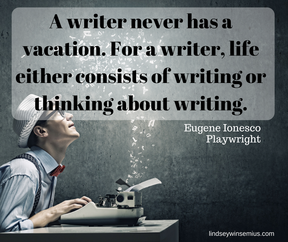 Thanks to all the beautiful authors whose words have been my therapy and my inspiration, that have driven me to laugh, cry, and filled my heart over the years. And you, dear readers, who step into our minds and hearts through our works and give us a reason to keep writing. Since I could first hold a pencil, I wanted to be a writer when I grew up. Stories of all kinds filled my head. I'd be creating fantasy worlds during long church sermons, when I couldn't sleep at night, on the bus ride home, and any time I had moments to myself. I read voraciously, and was quite young when I started stealing my mom's smutty romance novels. I'd have to hide them under my mattress, because my parents deemed them inappropriate for a child of my age (and probably rightly so!). I loved books. All books. Reading has been my favorite pass-time, my personal escape, and the key to worlds I could never imagine or might never visit. In college, I put away my dreams of being a writer, focusing on more practical careers options that have led me to my current career in marketing. However, the dream of being a writer always lingered. Last year, after working with indie authors on a research project for work, my husband encouraged me to do the ultimate research about being an indie author and become one myself. I took up the challenge, and on July of 2015, I published my first book, dystopian romance REAPER. The life of a writer is full of ups and downs; of hating my work and the exhilaration of a great review. Of days spent deleting text I'd just written, and other days pounding out chapters I'm excited to share. Authorship is still more of a hobby than a career for me, but it has gotten into my blood, like heroin, and I need it now. I can't stop thinking about it, and looking for stolen moments to get high on my drug of choice, tucked in the corner of my living room on my laptop, creating the worlds and weaving words that have always lived in my head, and are now begging to get out. Thanks to the authors who've inspired me, the indies who struggle alongside me, and the most of all, the READERS who voraciously devour the beloved words we've put to paper. Happy National Author Day!
Welcome to this page of the Zombie Crawl!
Don't forget to enter my GIVEAWAY by telling me your favorite Zombie book or movie in the comments and filling out the entry form! (Details at the end of the post)
If you're here, it is probably because you share my obsession: you love anything apocalypse, post apocalypse, or dystopian. And what better apocalypse than a Zombie Apocalypse?
Have you ever wondered why so many adore the mindless, gory, shambling flesh-eaters? Why do we love Zombies so much, in literature, film, and on Halloween? Below are the 10 reasons I believe Zombies hold such a special place in our hearts, even though theirs may not still be beating. In no particular order... 10 Reasons We Love Zombies: 1. Terrifyingly impossible. Attacks from terrorist, catastrophic natural disasters, and the slow destruction of our natural world… These are all terrifyingly real things that threaten mankind. But Zombies? They’re just pure entertainment without the genuine fear that comes with these other apocalyptic scenarios. We all logically know a Zombie Apocalypse is a scientific impossibility. Don’t just take my word for it. Cracked wrote an entire article about the scientific reasons that a Zombie Apocalypse would fail. I’ll summarize for you:
While books like Max Brook’s World War Z (which was made into a much-less convincing movie) might make the impossible sound probable, we all are quite aware of how unlikely a Zombie apocalypse really is. Which is why we can enjoy our Zombies, Undead, Walking Dead, Lexers, or whatever we’re calling them today, without an uncomfortable underlying fear that hey, this might actually be mankind’s fate in the near future…
2. Killing them is guilt-free.
As an author, it is my job to make sure the bad guys or girls are really bad, so when I off them in the end, we can all cheer together. But often, we still feel a bit of uncomfortable pity or guilt for the death of another human being (and least I hope you do, you sociopath, you). Zombies remove this guilt, because they are already dead. We can all cheer on the machete-wielding, crossbow bearing survivors that are madly stabbing, decapitating, or shooting the undead. Did he just stab a child? It is ok, because he was actually helping to free her from the horrible fate of zombieism. It is sad, it is terrible, but we can comfort ourselves with the knowledge that they really aren’t killing sentient beings, but rather an already-dead monster. No guilt, no sorrow, but plenty of gore. Booya, motherf*cker.
3. Society gets the punishment they deserve.
How many times have we seen people doing shitty things that we pray karma will pay them back for? Like that jerk who cut you off on the freeway, or the asshole who treated you poorly at work, or the really bad server at the restaurant who you’re pretty sure spit in your food, and maybe even urinated in your soup. What better punishment for a entitled, ungrateful society than ZOMBIES. It is basically karma for our destruction of other species, our planet, and crappy driving habits. 4. Zombies give us an enemy to fight. In many apocalyptic scenarios, like a natural disaster or the disappearance of natural resources or a nuclear holocaust, we don’t have anything to fight except nature. And there is only so much running from flood waters or shaking with fear while a earthquake destroys entire continents that is entertaining. We like to have a clear enemy to face. In a Zombie Apocalypse, the 'bad guys' are all around, and killing them is guilt-free (See #1 above). Zombies are the perfect enemy because they are mindless, non-sentient beings to decimate without remorse. They are also terrifying, disgusting, and just dangerous enough to keep us biting our nails in anticipation of the next surge that will always, ALWAYS appear unannounced at the most inopportune moment. Thank you, Zombies, for stepping up and being the enemy horror fans really need. 5. The great equalizer. At the end of the world, we’re all equal. It doesn’t matter what kind of sports car you drive, or how big your mansion, or what brand of clothing you’re wearing (unless it is Kevlar, and then you might have an advantage). We’re all at risk for a bite, and nobody gives a shit about your money; it is basically fire kindling at that point. The only people with an advantage are people with guns, survival skills, or a secret bunker underground equipped for years. (Since apparently the undead do not decay. Ever.) And even these folks usually meet a bad end. No one is safe. No one is superior. In the event of a Zombie apocalypse, we’re truly all equal in the eyes of the hungry hoards. They’ll eat anything. 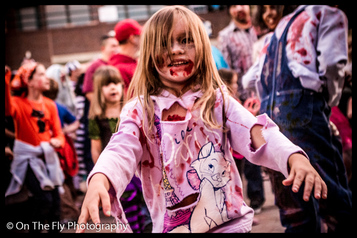
6. Gore, gore, and (I can’t look away!) more gore. It’s the train-wreck phenomenon. We hate to see the horror, but we can’t look away. Something about humanity is fascinated by terrible things happening to others. Perhaps we feel better knowing it wasn’t us. Perhaps we need the pure emotional response that comes from viewing tragedy. Or perhaps we’re just a really f*cked up race… Whatever the case, something about gore, violence, and tragedy calls to us on an emotional level that we just can’t look away. Zombies give us the gore and horror in buckets. By the mouthful. And at the end of a machete. So get your eyeful, and rest easy knowing it was all stage-makeup and superior acting. 7. Zombie apocalypse breaks past society’s barriers and reveals humanity’s core. Yeah, I know, now I’m getting a little philosophical for a fun little “listical”. But even the shoot ‘em ups need a moment of gravity. My favorite part of writing post apocalyptic / dystopian fiction (or whatever the hell we’re calling it these days) is the chance to really consider the human psyche and how we as individuals and as groups will react to such harsh scenario. When faced with tough choices, like kill or be killed, what would a mother do? A sister? A husband? What would I do? Zombie literature and movies allow us to glimpse the dark or good side of humanity when put to such tests. At our core, are we all just animals, trying to survive? To procreate? To feed? Or can even the animals the live inside our humanity show love, give mercy, or endure the end of the world? 8. Zombies can be amusing. At the end of the world, we all need a moment of levity. And if we can’t laugh at the shambling, moaning, and limbless monstrosities, what can we laugh about? If you've ever seen a Zombie movie or read a book, you already know the scariest thing at the end of the world is OTHER HUMANS, not the undead. So go ahead and giggle a little watching the antics of the walking dead. 9. Zombies never get old. See what I did there? We never get sick of Zombies, and they also don’t age. Because they’re dead… Ehem, anyway, Zombies have evolved over the years. We’ve seen the fast running rage zombies, shambling undead, mutated creature zombies, even animated Zombies our children can enjoy. And we’ve loved them all. 10. Zombies make great Halloween costumes. Do I really need to say more? What is more fun than dressing up (or down), smearing some blood all over ourselves, moaning like a mindless ninny, and wandering aimlessly down the street? I can’t think of anything else better, either. Enjoy your Halloween!
|
NEW!
|


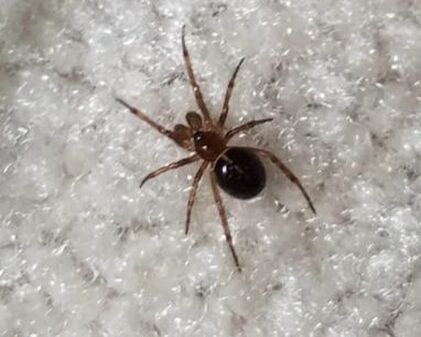
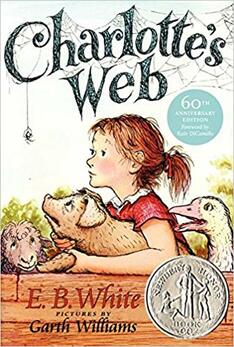

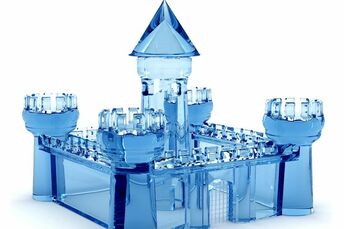
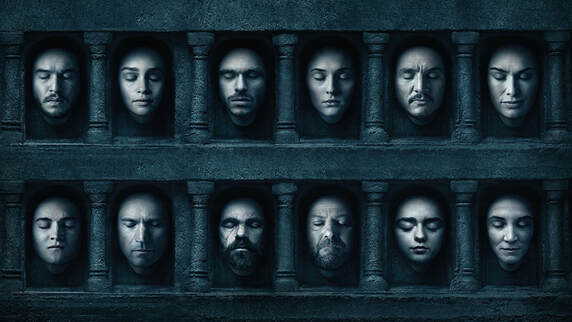
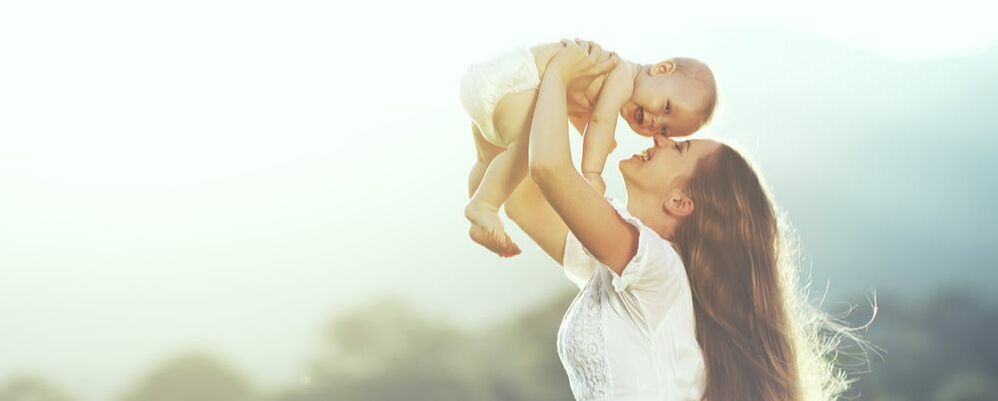
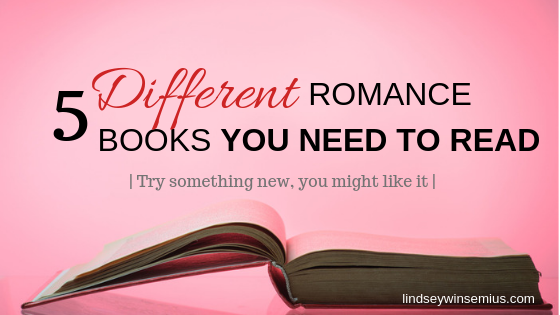
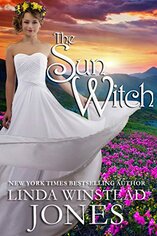
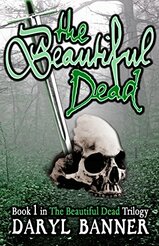
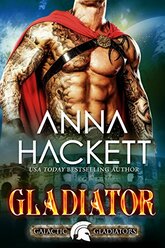
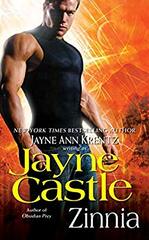
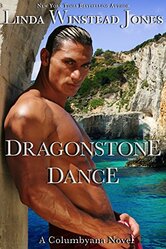

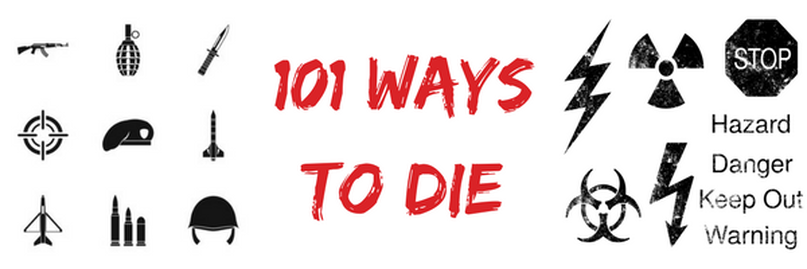
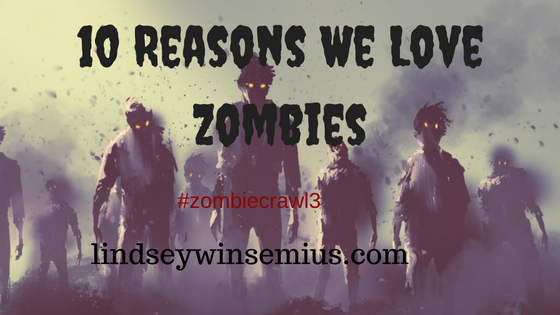
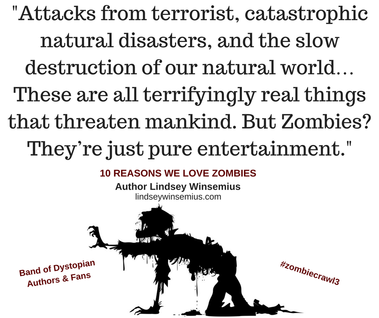
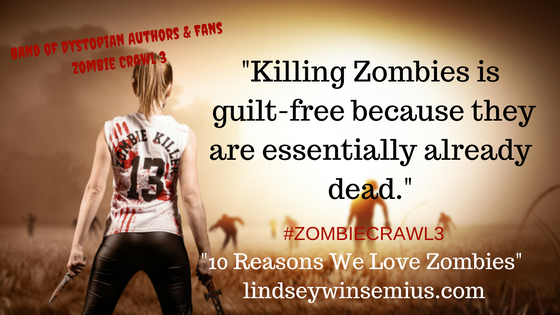
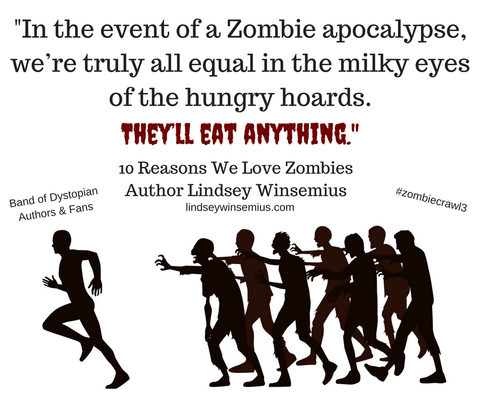
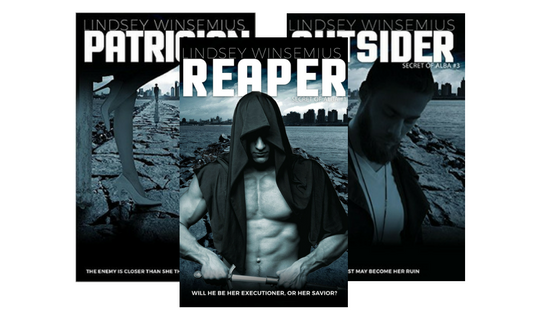
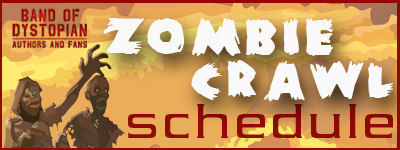

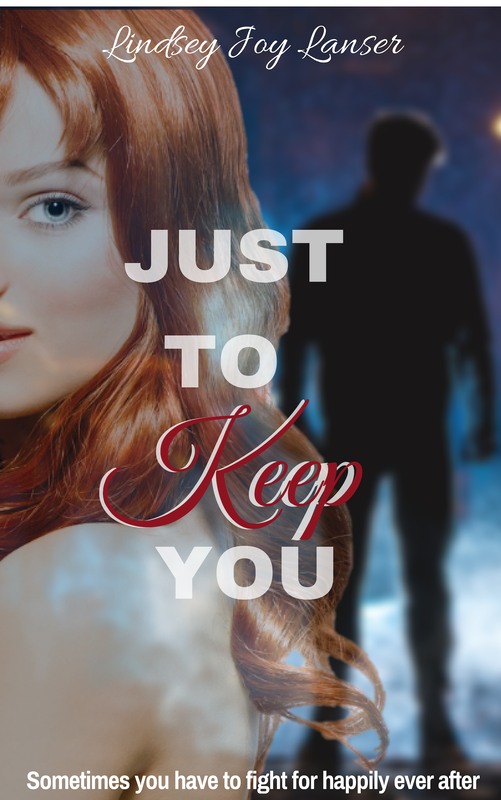
 RSS Feed
RSS Feed
